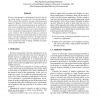Free Online Productivity Tools
i2Speak
i2Symbol
i2OCR
iTex2Img
iWeb2Print
iWeb2Shot
i2Type
iPdf2Split
iPdf2Merge
i2Bopomofo
i2Arabic
i2Style
i2Image
i2PDF
iLatex2Rtf
Sci2ools
104
click to vote
HOTOS
1999
IEEE
1999
IEEE
An Economic Approach to Adaptive Resource Management
Resource management is a fundamental concept in operating system design. In recent years it has become fashionable to consider the problem as an aspect of heterogeneous support for Quality of Service (`QoS'). The desire for QoS support leads to the dual management goals of global (system) and local (application) optimisation. In this paper we propose an architecture based on an economic model of resource management using frequently renegotiated timed resource contracts. We use dynamic pricing as a congestion feedback mechanism to enable applications to make system policy controlled adaptation decisions. We argue that this scheme has many advantages over a traditional central resource management entity including scalability and application specific adaptation.
Dual Management Goals | HOTOS 1999 | Operating System | Resource Management | Resource Management Entity |
Related Content
| Added | 03 Aug 2010 |
| Updated | 03 Aug 2010 |
| Type | Conference |
| Year | 1999 |
| Where | HOTOS |
| Authors | Neil Stratford, Richard Mortier |
Comments (0)

